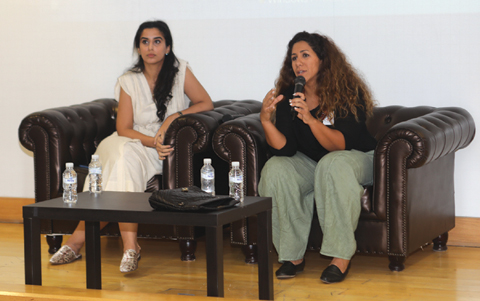Some of them physically and mentally tortured, sexually abused
 KUWAIT: Sheikha Bibi Al-Sabah and Rima Al-Mutairi discuss ‘Protecting Domestic Workers from Neo-slavery’ at the forum. —Photos by Joseph Shagra
KUWAIT: Sheikha Bibi Al-Sabah and Rima Al-Mutairi discuss ‘Protecting Domestic Workers from Neo-slavery’ at the forum. —Photos by Joseph ShagraKUWAIT: Social Work Society (SWS), a non-governmental organization spearheaded by its founder Sheikha Bibi Al-Sabah, organized a forum yesterday to speak about the most vulnerable workers in the country - domestic helpers. The forum entitled 'Protecting Domestic Workers from Neo-slavery' was held at the Gulf University for Science and Technology (GUST) in collaboration with Human Line Organization (HLO), Human Rights Club and the Ministry of Interior.
"I have noticed for many years that if we talk about the issue of domestic helpers, we get very defensive. We have to look at this issue with an open mind - we should not look at it as an attack on us as Kuwaitis. We should not allow this to happen; because I love my country inasmuch as I wish that every human being living in this land will be treated fairly with respect. I am not attacking everyone because there are many good employers - but many domestic helpers in Kuwait are not paid. They are not paid on time; they are not paid according to their contracts; they are not allowed to go out on regular day offs or even holidays. Some of them are insulted, and worse, physically and mentally tortured, and some are sexually abused," Sheikha Bibi said.
She said since she began working at SWS, more than half of the days in a week are spent at the police station ensuring the rights of mostly domestic helpers are respected. Most of the time, she said police argue that most domestic help issues can be settled between the employer and the employee. "How can you reconcile, especially when you see housemaids with black and blue bruises? Why should you settle with an employer when you see they are obviously mistreated and abused? This happens when there is no protection. The law is there, but we have to understand it. We are a country that respects the law; we are known as humanitarian champions, so we have to implement the law," she said.
Sheikha Bibi then spoke about two cases handled by SWS involving Filipina and Madagascan maids who were mistreated. In line with its objectives, the SWS together with the Human Rights Club, HLO and the interior ministry will launch an information booklet as part of a bigger and wider campaign to inform housemaids and employers about their rights. "We are here to make you understand the issue. Let's have an open dialogue. I know you can help us find solutions for this problem. Join us in this campaign to change our society - many of us do not want to discuss this issue, but we have to be open-minded. If we cannot completely stop the abuses, we want to minimize these cases as much as we can," Sheikha Bibi said.
"When we established SWS in 2005, we did not have a domestic labor law, no anti-human-trafficking law, there was no shelter for migrant workers, and the labor law was not upgraded. At that time, there was not much I could do except rescue vulnerable people through embassies. In 2010, the labor law was improved a bit, the human trafficking law was enacted in 2013 and in 2015, the domestic workers law was implemented. In 2014, the government established a shelter for runaways," she explained. Rima Al-Mutairi of Human Line Organization said along with SWS, they were able to come up with a booklet to help domestic helpers understand their rights and demands. "The booklet will be available in Kuwait in 15 languages so that everyone will be able to understand their basic rights. We have included contacts of embassies, co-ops, hospitals, police stations, etc," she said.
By Ben Garcia










